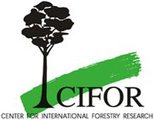The Center for International Forestry Research (CIFOR) has compiled and published a series of briefs titled 'Gender and Climate Change: Evidence and Experience' seeking to address gender and climate change policy issues by drawing on the experience of contributing partner organizations, including: CIFOR, Bioversity International, CARE International, the CGIAR Research Program on Climate Change, Agriculture and Food Security (CCAFS), the Global Greengrants Fund (GGF), the International Union for Conservation of Nature (IUCN), UN Women, the UN Development Programme and UN Environment Programme (UNDP-UNEP) Poverty-Environment Initiative, and the Women's Environment & Development Organization (WEDO).
 December 2015: The Center for International Forestry Research (CIFOR) has compiled and published a series of briefs titled ‘Gender and Climate Change: Evidence and Experience’ seeking to address gender and climate change policy issues by drawing on the experience of contributing partner organizations, including: CIFOR, Bioversity International, CARE International, the CGIAR Research Program on Climate Change, Agriculture and Food Security (CCAFS), the Global Greengrants Fund (GGF), the International Union for Conservation of Nature (IUCN), UN Women, the UN Development Programme and UN Environment Programme (UNDP-UNEP) Poverty-Environment Initiative, and the Women’s Environment & Development Organization (WEDO).
December 2015: The Center for International Forestry Research (CIFOR) has compiled and published a series of briefs titled ‘Gender and Climate Change: Evidence and Experience’ seeking to address gender and climate change policy issues by drawing on the experience of contributing partner organizations, including: CIFOR, Bioversity International, CARE International, the CGIAR Research Program on Climate Change, Agriculture and Food Security (CCAFS), the Global Greengrants Fund (GGF), the International Union for Conservation of Nature (IUCN), UN Women, the UN Development Programme and UN Environment Programme (UNDP-UNEP) Poverty-Environment Initiative, and the Women’s Environment & Development Organization (WEDO).
Funded by the UK Department for International Development (DfID), the series consists of nine briefs that provide insights and recommendations on a range of current and emerging policy issues concerning gender and climate change.
Following an introduction by CIFOR, titled ‘Gender and climate change: Evidence and experience,’ the opening brief ‘Seeds of adaptation: Climate change, crop diversification and the role of women farmers,’ by Bioversity International, discusses women farmers’ role in putting into practice crop and varietal conservation and diversification strategies as a way to strengthen local climate change adaptation capacities.
‘Changing the climate: Why gender matters to achieving equitable sustainable development,’ by CARE International, reviews lessons from practical approaches to integrating gender into community-based adaptation and food security in Ghana and Bangladesh.
‘Climate change, policy change: Five policy lessons to support women farmers in a changing climate,’ by CCAFS, highlights policy lessons on providing support to women farmers, and offers guidelines for crafting gender-responsive climate policies at global and national levels.
Two briefs were contributed by CIFOR. ‘At the intersection of inequities: Lessons learned from CIFOR’s work on gender and climate change adaptation in West Africa’ argues that effective and responsive adaptation planning needs to take into account the ways in which gender intersects with other factors, such as ethnicity, economic assets and social status. ‘Gender mainstreaming in REDD+ and PES Lessons learned from Viet Nam’ discusses prerequisites for gender mainstreaming in REDD+ and payments for ecosystem services (PES), including a policy on gender equity, political will and sufficient capacity in government agencies at various levels of governance.
The series also includes: ‘Catalyzing sustainable and just change through funding: Overview and key recommendations from Climate Justice and Women’s Rights: A Guide to Supporting Grassroots Women’s Action’ by the GGF; ‘Knowledge is power: Enhancing data for action on women’s rights, equality and environmental sustainability via the Environment and Gender Index (EGI)’ by IUCN; ‘Gender equality as a pathway for sustainable development: Lessons learned in Eastern and Southern Africa’ by UN Women and the UNDP-UNEP Poverty-Environment Initiative; and ‘Gender equality in the climate agreement’ by WEDO. [Publication: Gender and Climate Change: Evidence and Experience] [CIFOR Publication Announcement]